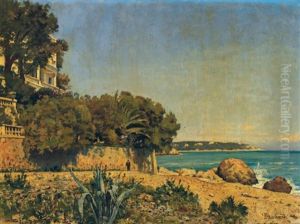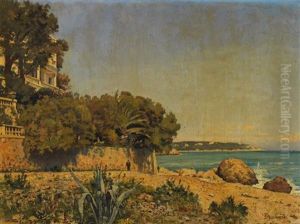Pierre Francois Bouchard Paintings
Pierre François Bouchard, born in 1771 and passing away in 1822, was not an artist in the traditional sense of painting, sculpture, or visual arts. Instead, he is historically significant for a monumental discovery that bridged the worlds of archaeology and linguistics, impacting the study of ancient Egyptian civilization. Bouchard was a French engineer and officer in Napoleon's army during the French campaign in Egypt and Syria from 1798 to 1801. His name became indelibly linked to the history of Egyptology for his discovery of the Rosetta Stone in 1799.
While overseeing fortifications at Fort Julien near the town of Rosetta (Rashid), Bouchard noticed a slab of black basalt inscribed with inscriptions in two languages, Egyptian and Greek, and three scripts, Hieroglyphic, Demotic, and Greek. Recognizing its potential significance for understanding the hitherto undeciphered Egyptian hieroglyphs, he ensured its preservation. The Rosetta Stone, named after the location of its discovery, became a cornerstone in the decipherment of Egyptian hieroglyphs, particularly through the work of Jean-François Champollion in 1822.
Bouchard's role in the discovery highlights the interconnectedness of military campaigns and archaeological discoveries during the 18th and 19th centuries, a time when European powers were expanding their knowledge of ancient civilizations. Although not an artist, his contribution to the field of Egyptology and the broader understanding of ancient art and writings has been invaluable. Bouchard's discovery of the Rosetta Stone has been celebrated as one of the most important archaeological finds, providing a key to unlock the language and culture of ancient Egypt. After his return to France, Bouchard continued his engineering career, but his name remains most closely associated with the Rosetta Stone and its pivotal role in deciphering ancient Egyptian texts. Pierre François Bouchard's legacy is that of a military engineer whose alert observation and appreciation for the significance of an inscribed stone significantly advanced our understanding of ancient civilizations.


















